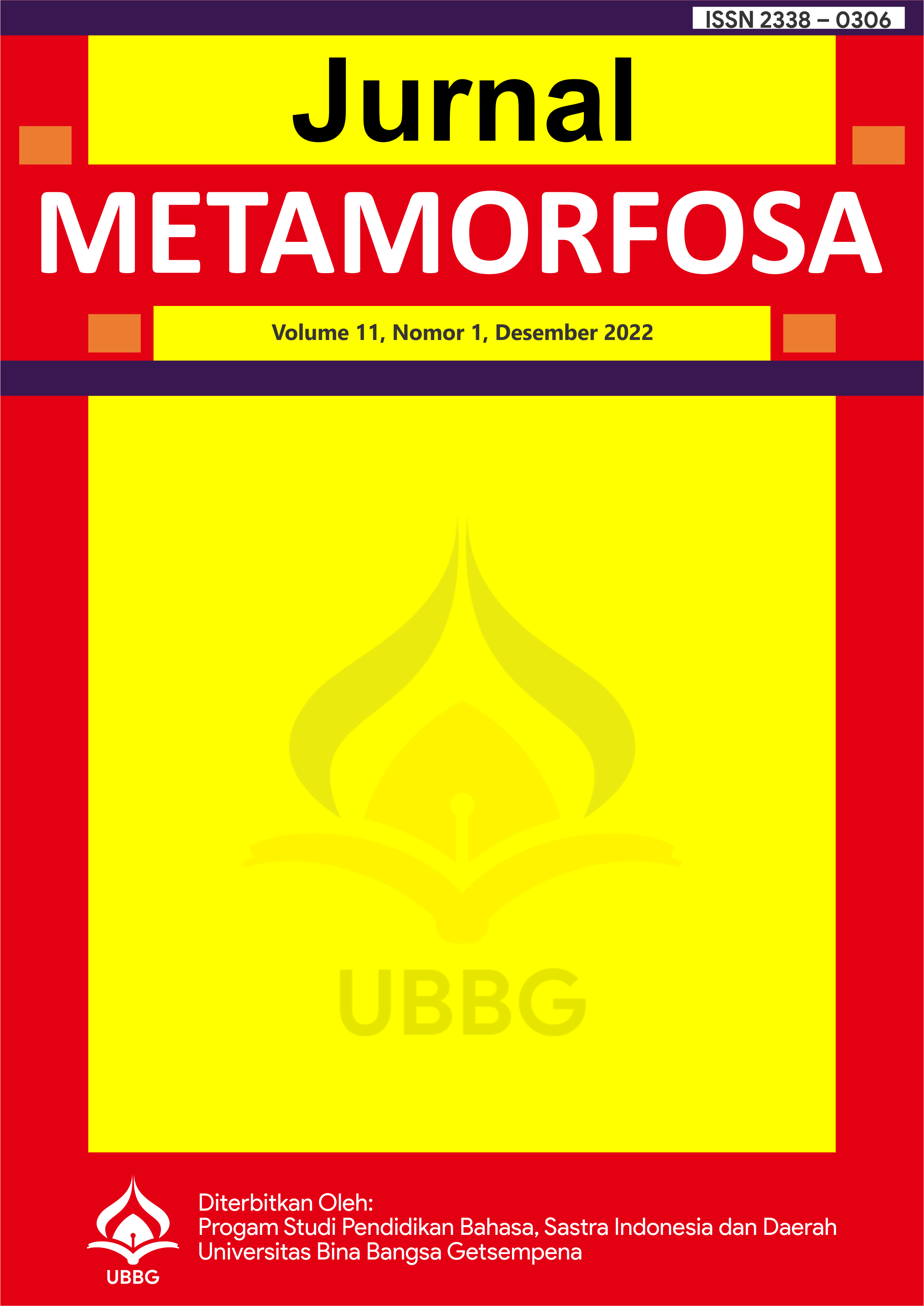MODEL PEMBELAJARAN PROBLEM BASED LEARNING DALAM MENGEMBANGKAN KETERAMPILAN PEMAHAMAN MEMBACA META-KOGNITIF MAHASISWA
Abstract
Tujuan utama dari penelitian ini adalah untuk mengembangkan pemahaman membaca metakognitif mahasiswa menggunakan model pembelajaran problem based learning. Subjek penelitian adalah 30 mahasiswa di Akademi Farmasi Mandiri YPPM. Penelitian ini menggunakan desain kuasi-eksperimental dengan satu kelompok. Hasil penelitian ini menunjukkan bahwa mahasiswa memiliki keterampilan membaca pemahaman yang meliputi menebak, mendeskripsikan, menganalisis dan mengidentifikasi gagasan utama. Dengan demikian, model pembelajaran yang dirancang dan digunakan untuk mengembangkan keterampilan membaca pemahaman meta-kognitif. Temuan penelitian ini menunjukkan bahwa ada perbedaan statistik antara nilai rata-rata siswa pada pretest dan posttest, dan ada perbedaan statistik antara nilai rata-rata siswa pada posttest pada level 0,05. Hal ini dapat disimpulkan bahwa Model pembelajarn PBL dapat mengembangkan keterampilan membaca pemahaman metakognitif mahasiswa.
References
Alshammari, R. F. (2022a). The Effect of Inquiry-Based Learning Strategy on Developing Saudi Students’ Meta-Cognitive Reading Comprehension Skills. English Language Teaching, 15(5). https://doi.org/doi: 10.5539/elt.v15n5p43
Alshammari, R. F. (2022b). The Effect of Inquiry-Based Learning Strategy on Developing Saudi Students’ Meta-Cognitive Reading Comprehension Skills. English Language Teaching, 15(5), 43. https://doi.org/10.5539/elt.v15n5p43
Ardhian, T., Ummah, I., Anafiah, S., & Rachmadtullah, R. (2020). Reading and critical thinking techniques on understanding reading skills for early grade students in elementary school. International Journal of Instruction, 13(2), 107–118. https://doi.org/10.29333/iji.2020.1328a
Barus, I. R. G., Simanjuntak, M. B., & Resmayasari, I. (2021). READING LITERACIES THROUGH EVIETA-BASED LEARNING MATERIAL: STUDENTS’PERCEPTIONS (Study Case Taken from Vocational School–IPB University). Journal of Advanced English Studies, 4(1), 15–20.
Carmel, J. H., Herrington, D. G., Posey, L. A., Ward, J. S., Pollock, A. M., & Cooper, M. M. (2019). Helping Students to “Do Science”: Characterizing Scientific Practices in General Chemistry Laboratory Curricula. Journal of Chemical Education, 96(3), 423–434. https://doi.org/10.1021/acs.jchemed.8b00912
Chis, A. E., Moldovan, A.-N., Murphy, L., Pathak, P., & Muntean, C. H. (2018). Investigating flipped classroom and problem-based learning in a programming module for computing conversion course. Journal of Educational Technology & Society, 21(4), 232–247.
Du, X., Nomikos, M., Ali, K., Lundberg, A., & Abu‐Hijleh, M. (2022). Health educators’ professional agency in negotiating their problem‐based learning (PBL) facilitator roles: Q study. Medical Education.
Duru, A., & Koklu, O. (2011). Middle school students’ reading comprehension of mathematical texts and algebraic equations. International Journal of Mathematical Education in Science and Technology, 42(4), 447–468.
Fidan, M., & Tuncel, M. (2019). Integrating augmented reality into problem based learning: The effects on learning achievement and attitude in physics education. Computers & Education, 142, 103635.
Fitriani, A., Zubaidah, S., Susilo, H., & Al Muhdhar, M. H. I. (2020). The effects of integrated problem-based learning, predict, observe, explain on problem-solving skills and self-efficacy. Eurasian Journal of Educational Research, 2020(85), 45–64. https://doi.org/10.14689/ejer.2020.85.3
Kaewchote, N., & Wattanathum, C. (2022). Model of Developing Teachers Competencies in the Bangkok Metropolitan Administration Base on Active Learning Design for Students to Thailand 4.0. Creative Education, 13(5), 1564–1576.
Khoiriyah, A. J., & Husamah, H. (2018). Problem-based learning: Creative thinking skills, problem-solving skills, and learning outcome of seventh grade students. JPBI (Jurnal Pendidikan Biologi Indonesia), 4(2), 151–160.
Kim, N. J., Belland, B. R., & Walker, A. E. (2018). Effectiveness of computer-based scaffolding in the context of problem-based learning for STEM education: Bayesian meta-analysis. Educational Psychology Review, 30(2), 397–429.
Kusmiarti, R., & Hamzah, S. (2019). Literasi dalam Pembelajaran Bahasa Indonesia di Era Industri 4.0. Seminar Nasional Pendidikan Bahasa Dan Sastra, 211–222. https://ejournal.unib.ac.id/semiba/article/view/10300/5174
Nurjanah, R. L. (2018). The analysis on students’ difficulties in doing reading comprehension final test. Metathesis: Journal of English Language, Literature, and Teaching, 2(2), 253–264.
Nuurjannah, F. A. (2020). Pembelajaran Tutorial Dengan Kemampuan Berpikir Kritis Mahasiswa Di Program Studi D3 Kebidanan Unpad. Jurnal JKFT, 5(1), 80–91. http://jurnal.umt.ac.id/index.php/jkft/article/view/2804
Öztürk, M., Akkan, Y., & Kaplan, A. (2020). Reading comprehension, Mathematics self-efficacy perception, and Mathematics attitude as correlates of students’ non-routine Mathematics problem-solving skills in Turkey. International Journal of Mathematical Education in Science and Technology, 51(7), 1042–1058.
Patiung, D. (2016). Membaca sebagai sumber pengembangan intelektual. Al Daulah: Jurnal Hukum Pidana Dan Ketatanegaraan, 5(2), 352–376.
Ramadhani, R., Rofiqul, U., Abdurrahman, A., & Syazali, M. (2019). The effect of flipped-problem based learning model integrated with LMS-google classroom for senior high school students. Journal for the Education of Gifted Young Scientists, 7(2), 137–158.
Saunders, L., & Wong, M. A. (2020). Active Learning: Engaging People in the Learning Process. Instruction in Libraries and Information Centers.
Sistermans, I. J. (2020). Integrating competency-based education with a case-based or problem-based learning approach in online health sciences. Asia Pacific Education Review, 21(4), 683–696.
Sun, G., & Zhuang, Q. (2022). The Application of the PBL Teaching Model in Chinese Primary School. 2022 8th International Conference on Humanities and Social Science Research (ICHSSR 2022), 58–63.
Tan, O.-S. (2021). Problem-based learning innovation: Using problems to power learning in the 21st century. Gale Cengage Learning.




















